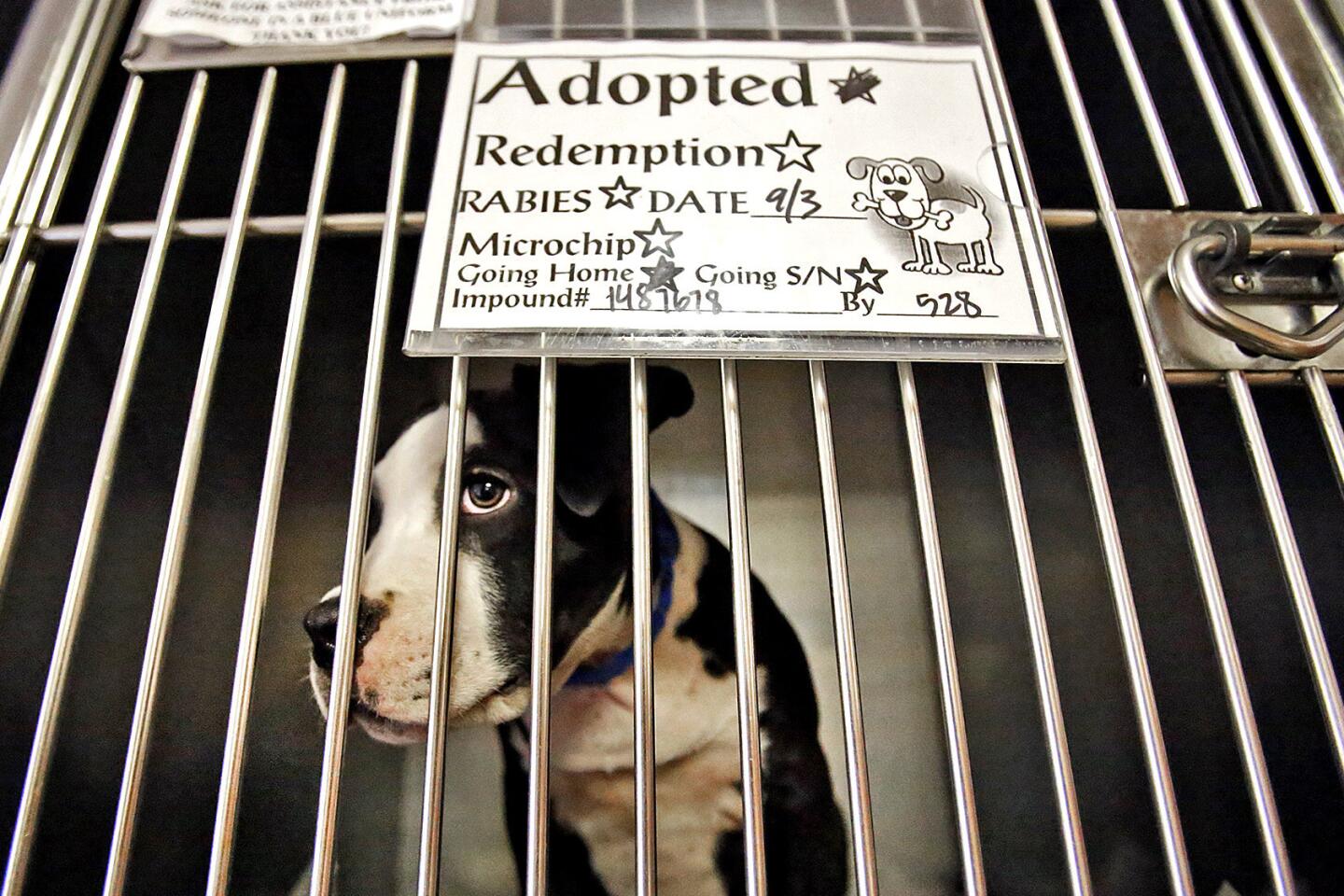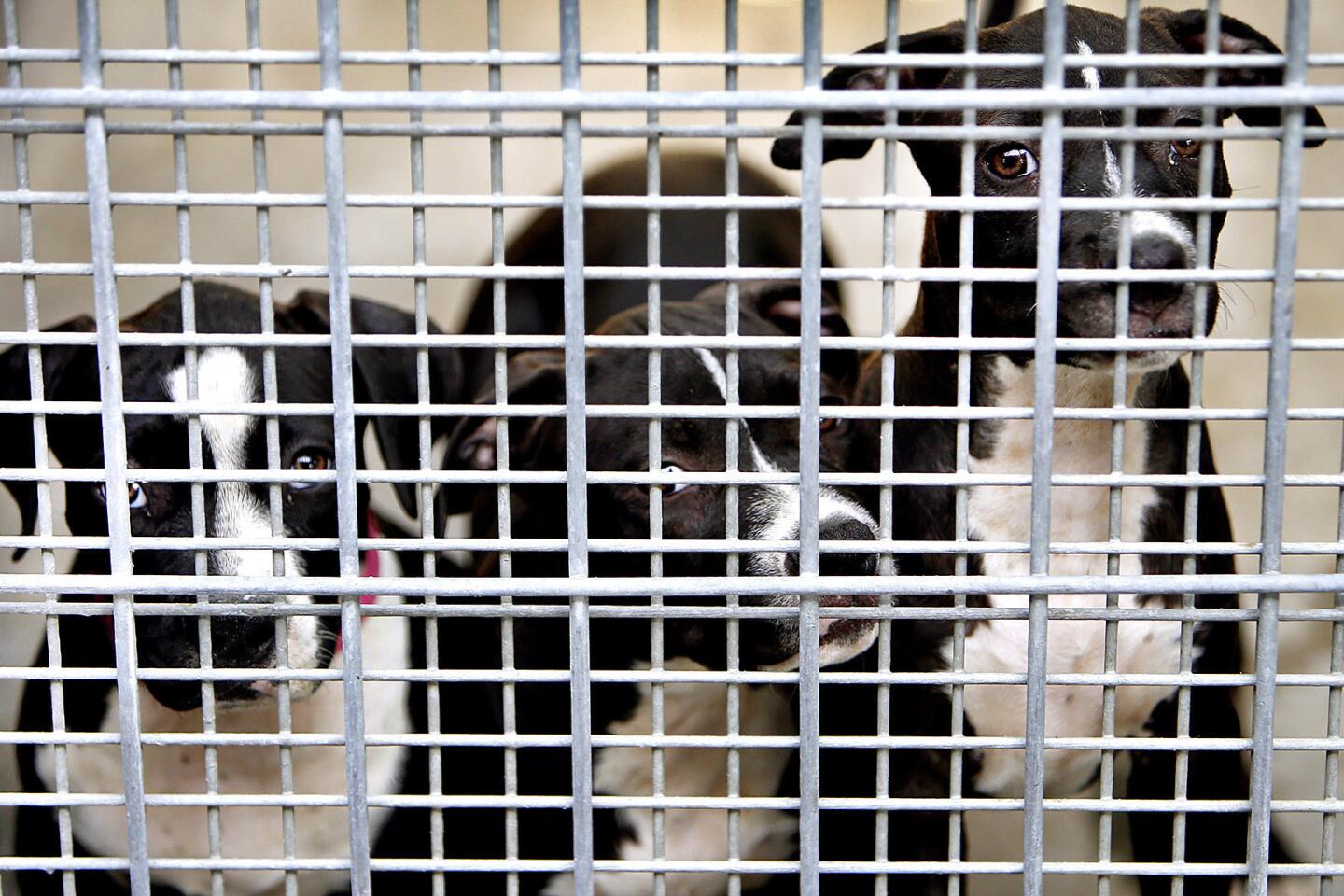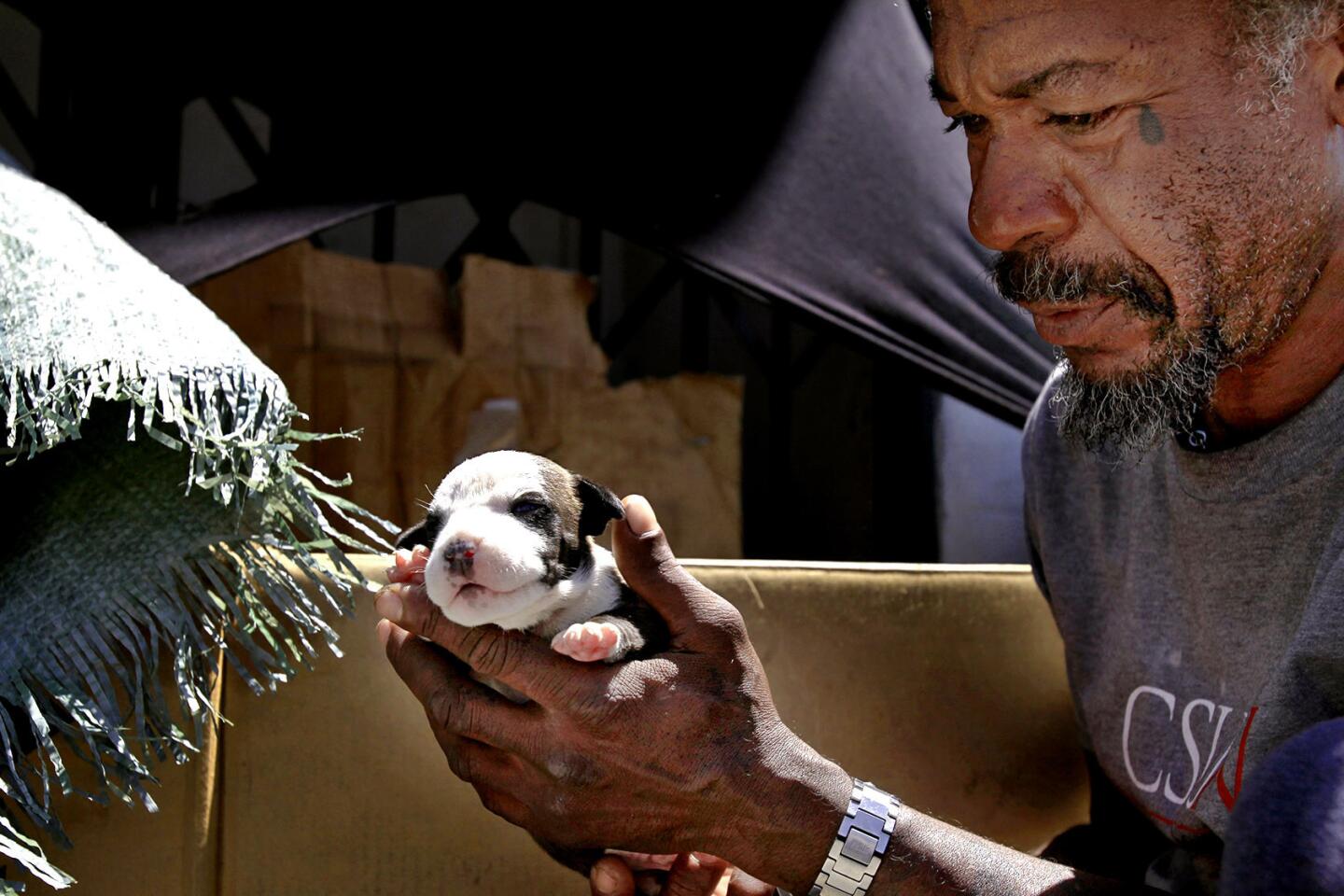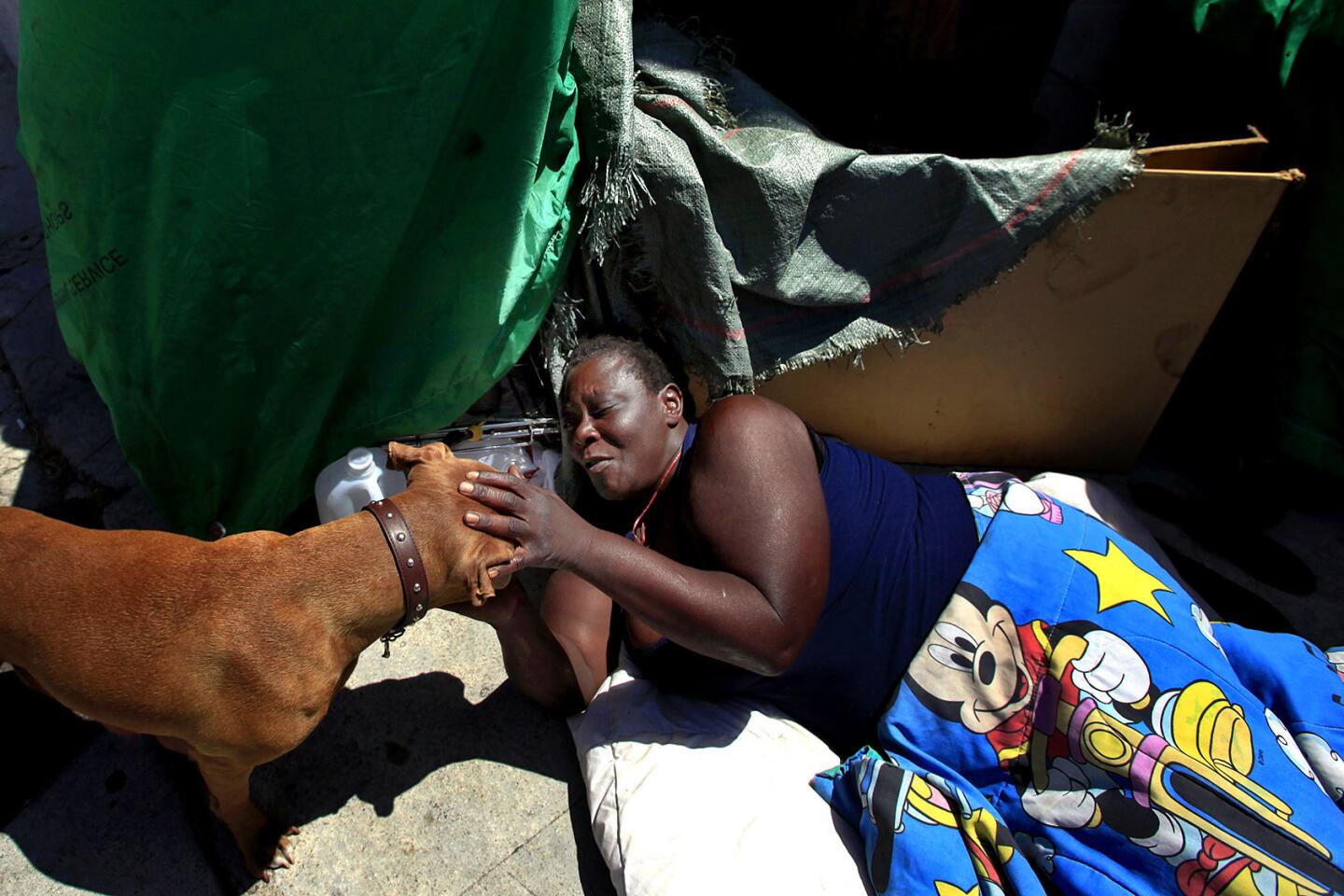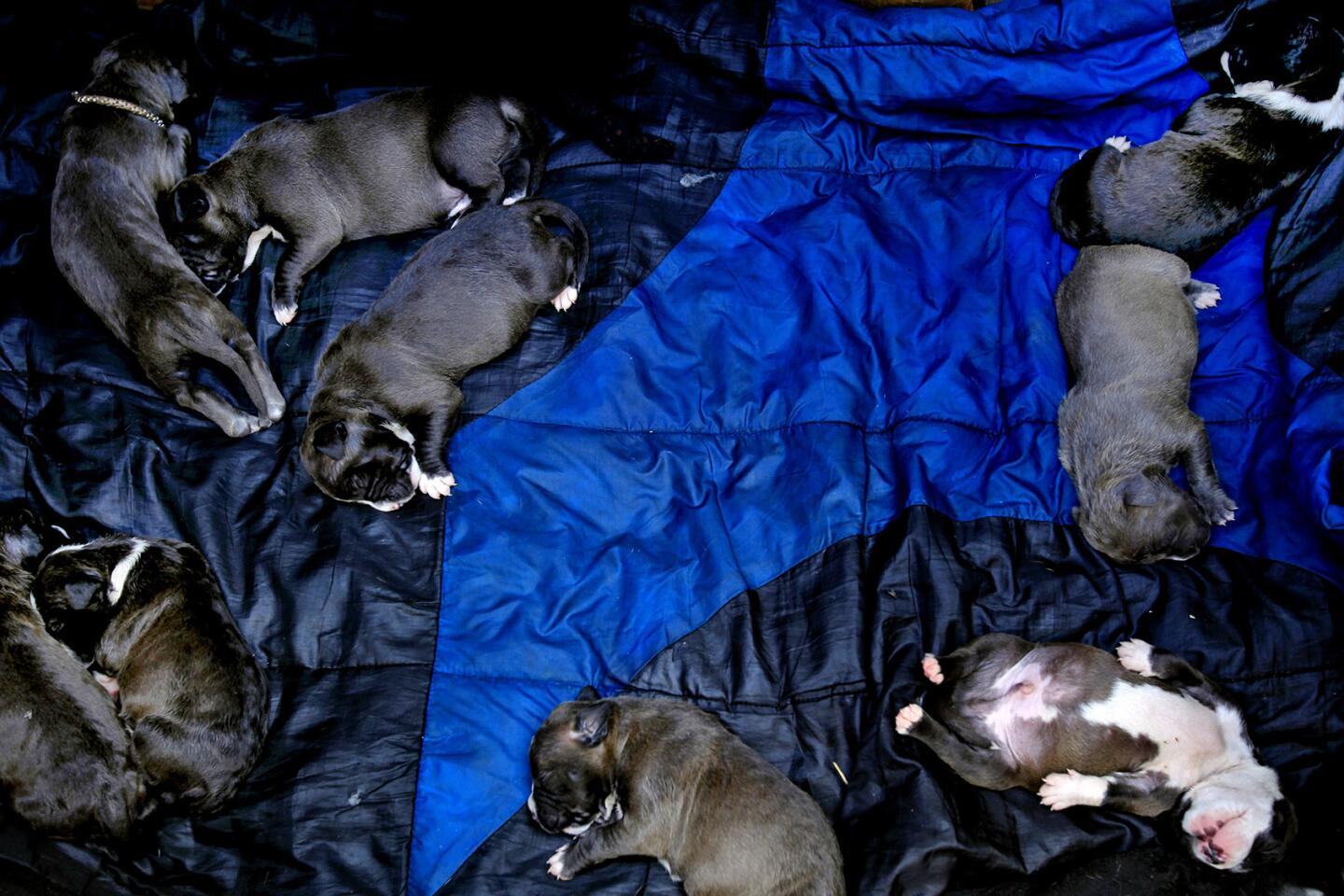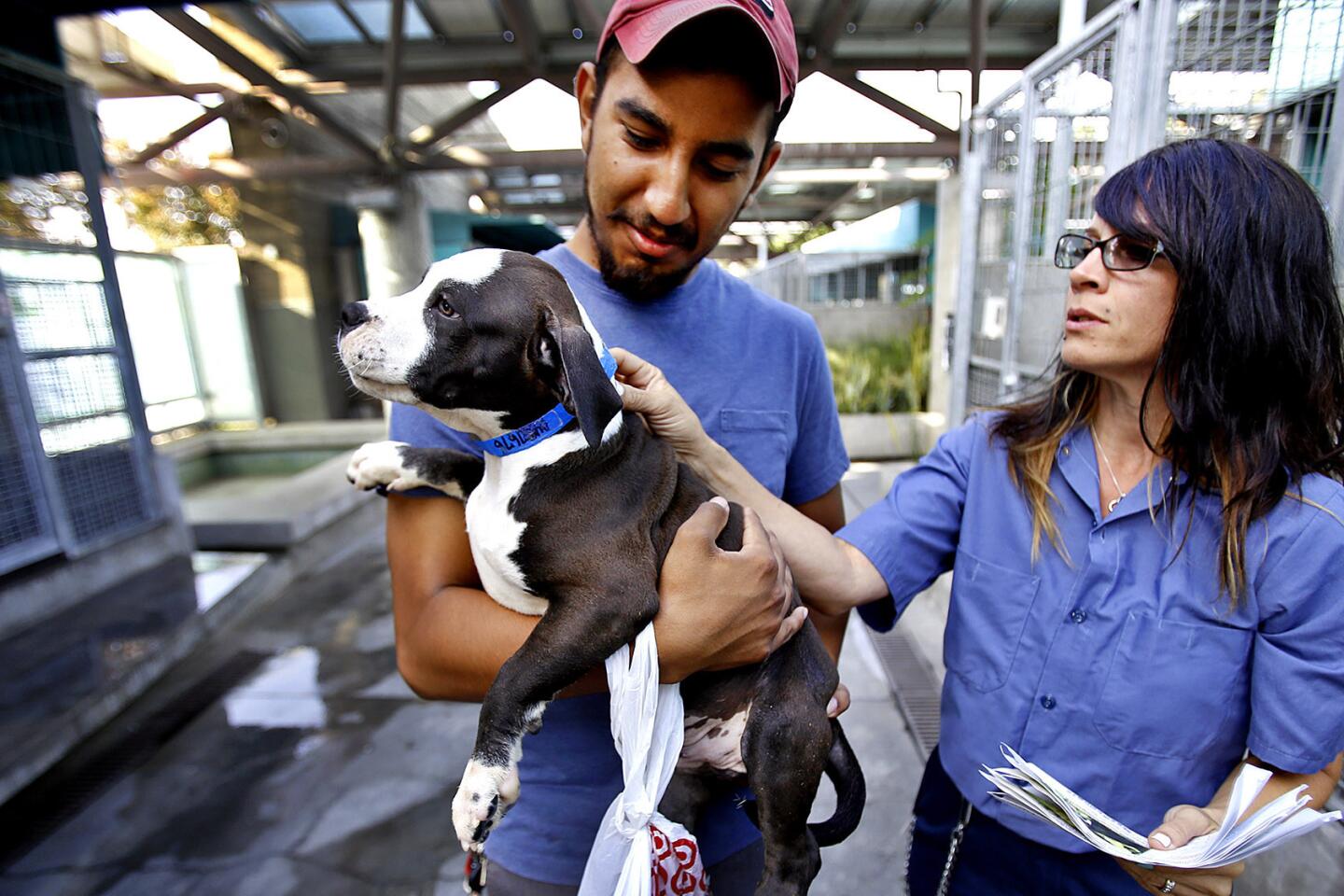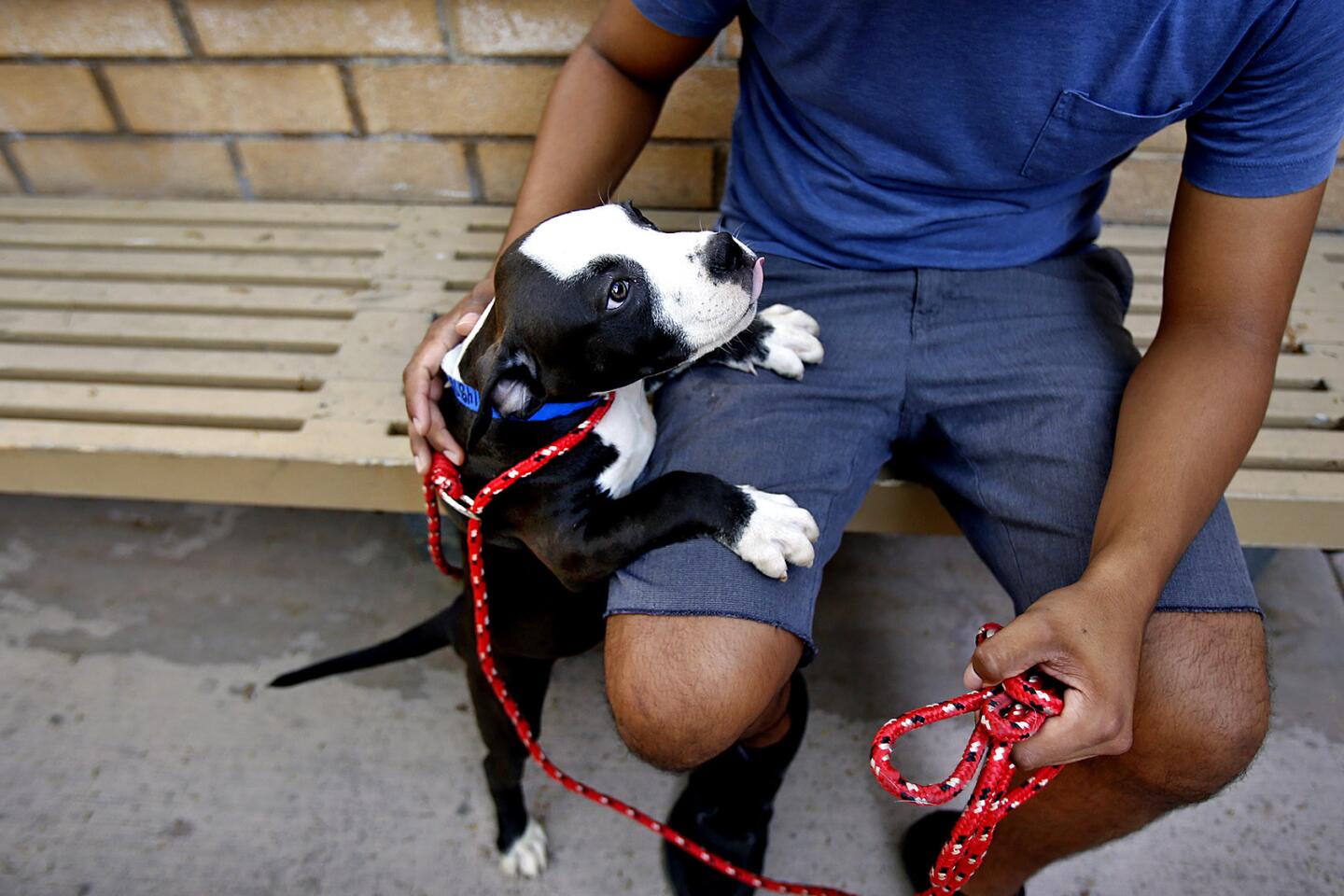Great Read: Hounding a homeless man into giving up his dogs
- Share via
Gerrick Miller tugged on a blue tarp to shade his pit bull puppies from the sun blasting their plywood pen.
Tucked into a concrete corner just outside skid row, the newborns squirmed in a mass of black, silver, copper and white fur, squealing softly next to their mom, Sugar. Miller wiped gunk out of one of their eyes with his finger.
A bag of dog food lay on top of Miller’s shopping cart. Sympathetic downtown workers and rescuers kept him in kibble, he said.
At a word from Miller, Sugar loped down the sidewalk to relieve herself in a weed patch, then returned and submitted to the puppies’ nursing.
But Miller wasn’t the only one watching over the puppies: Shortly after they were born, an animal rescuer videotaped them sleeping in a cardboard box. Strangers whizzed by, snapping photos of Sugar and the raggedy shopping carts and tent that made up Miller’s sidewalk encampment.
City officials were barraged by email blasts accusing Miller of operating a puppy mill for profit.
“The homeless have become a serious problem of abuse and contributing to pet over population,” Jennifer Pryor, head of an Encino animal rescue group, said in an email to Brenda Barnette, chief of the Los Angeles Animal Services Department.
The rescuers demanded that Animal Services confiscate Sugar and her 10 puppies. Barnette replied that the dogs were not “illegal (like drugs for example) that can be seized.”
For a week, the puppies remained on the sidewalk, dividing the rescue community and confounding officials unsure of the law, or reluctant to enforce it. Miller jumped from corner to corner to evade Animal Services officers and the rescuers.
“The only friends I got is those dogs right there,” Miller said. “The only ones I trust.”
::
In Los Angeles’ balmy climate, pets belonging to the homeless are a familiar sight, loping along skid row, lying on the pavement next to a panhandler or crouching on a girl’s shoulder in the subway.
A quarter of the nation’s 600,000 homeless people keep pets, said Genevieve Frederick, founder of Pets of the Homeless, a Nevada nonprofit that provides veterinary care and food to street animals.
Some homeless people get dogs for protection, but the vast majority are companions, Frederick said. Shunned by many, ignored by most, homeless people live lives of piercing loneliness, she said.
“These pets provide them with something they need to feel human: unconditional love, loyalty,” she said.
Frederick said most homeless people make good pet owners. “They’ll feed their animals before they eat themselves,” she said.
Miller’s critics say homeless people can’t care for pets. They can’t even care for themselves.
Homeless people breed pit bulls to sell as fighting dogs, the activists say. They don’t seek veterinary care, and the dogs become ill or die of diseases rampant in the streets, such as parvo. Many wind up lost or abandoned at a city shelter, where they face months of captivity or euthanasia, they say.
“If people are struggling, homeless and have addictions, another responsibility is not appropriate,” said Whitney Hope Smith, a rescuer who videotaped Miller’s camp. “It’s very easy to give a sob story for homeless, but the endgame for the animals isn’t pretty.”
::
Miller, 52, is a loner. He set up his tent on a quiet corner on the outskirts of skid row, avoiding the cardboard cities in the 50-block district’s riotous center.
He said he ended up homeless after a fight with his girlfriend. Relationships appeared to be a sore point. Several times, he emphasized that a companion, Diana Melton, was not his girlfriend. They stayed in separate camps, he said.
He tried the missions but said the food was moldy. He walked out of a drug program.
“Six to seven meetings a day; it wasn’t for me,” he said.
Miller had been in and out of jail, mainly for drug possession. Melton said he’d been doing well with his parole officer.
“He doesn’t want to go back to jail, because of the puppies,” she said.
Miller said he mated Sugar with a blue-point pit bull because, well, he wanted to.
“Give me a break. Everybody like puppies,” he said. “I’ve been messing around with dogs all my life.”
Sugar was a good mother, he said. Once, when he was changing locations, “I forgot one of the puppies,” Miller said. “She came back and picked him up with her teeth.”
Miller said the puppies were not for sale. He said he was keeping some, giving others to Melton, who wrapped a necklace around one puppy’s neck to mark him as hers, and to the blue-point’s owner. The rest were promised to family and a woman with a house “and a yard,” he said.
Miller said he had refused a rescuer’s offer to buy one of the newborns.
“I don’t care how much money they got.” he said. “They’re not getting my puppies.”
::
Jennifer Pryor, the widow of comedian Richard Pryor, takes a bare-knuckle approach to animal advocacy. She said she was outraged that Barnette didn’t cite Miller for breeding without a permit or for breaking the city’s spay and neuter law.
“We rescuers are all drowning because of the laws that remain un-inforced by [Animal Services] and Brenda Barnette,” Pryor said in an email. “No laws enforced.”
Barnette did not respond to repeated requests to discuss the case.
To demonstrate the city’s inaction, Smith, the rescuer, videotaped a bicycle cop talking to Miller and then riding away without ticketing him. Her surveillance report to Pryor was delivered in a just-the-facts-ma’am, “Dragnet” style.
“As I passed by in car I rolled my window down to see what I could hear,” Smith emailed Pryor. “Cop nods to homeless man and both ride off.”
Miller was bitter that the rescuers worried only about puppies living in the streets. What about him?
“Ain’t nobody coming down here to help us,” Miller said. “All they talk is dog, dog, dog.”
Pryor said Miller was trying to deflect attention from his own conduct breeding the dogs.
“That’s such a manipulation,” she said. “That’s what they said to all of us down in the hood.”
Lori Weise, the longtime head of Downtown Dog Rescue, agreed that the sidewalks were no place for 10 soon-to-be rambunctious pit bulls. They could get sick or hurt. “I have seen homeless people burned right out of their tents,” Weise said.
One day in June, Weise called Claudia Perez, a skid row rescuer who helps homeless people and their pets, to the camp. Miller was with police and Animal Services officers. He was refusing to give up the dogs.
Perez reasoned with him: The shelter would hold the dogs as his personal property. After they were fixed and vaccinated, he could reclaim them.
Miller relented, and Melton, sobbing, helped him push two shopping carts full of puppies to the Animal Services truck.
Perez drove Miller and Melton to the shelter for a final look at the puppies behind glass in quarantine kennels.
::
Days later, Miller was arrested on a drug possession charge. He was sentenced to a year in a rehabilitation program.
“This is a lot better than the streets,” he said in a phone interview from the rehab center, half a mile from his former homeless camp.
Barnette extended the hold on the dogs until officers could talk to Miller. He told them to find the dogs good homes.
Sugar and the puppies were released for adoption Sept. 3. An hour later, Salvador Ornelas, 22, a museum guide who plans to graduate from Cal State Northridge this semester, walked out with the chubbiest puppy.
“I want to take him hiking, walking and running,” said Ornelas, who lives with his family in Lincoln Heights.
Garens Loyd, the acting shelter supervisor, said he was confident the puppies would be taken. He wasn’t so sure about Sugar. She’s shy, and her belly and teats sag from having litters.
Perez said Miller is worried Sugar will be put down.
“The problem is they stereotype all homeless people,” she said of the rescuers. “Gerrick loved his dogs.”
Twitter: @geholland
More to Read
Sign up for Essential California
The most important California stories and recommendations in your inbox every morning.
You may occasionally receive promotional content from the Los Angeles Times.
